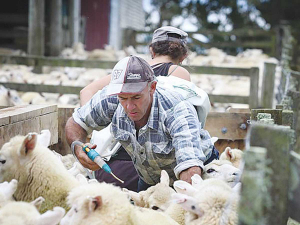Move over ham, here comes lamb
It’s official, lamb will take centre stage on Kiwi Christmas tables this year.
 With new lambs on the ground farmers are being urged to make an internal parasite management plan for the coming season.
With new lambs on the ground farmers are being urged to make an internal parasite management plan for the coming season.
As this season’s lamb crop hits the ground, farmers are being urged to make an internal parasite management plan for the coming season.
Dannevirke-based vet and Wormwise national spokesperson Simon Marshall, says if farmers are considering drenching ewes at docking, they should carry out out Faecal Egg Counts (FECs) on a sample of ewes first.
The results of the FECs, in combination with body condition scores and pasture cover assessments, will help determine whether ewes need a drench at that time. But lambs are the focus in spring and farmers should be working with their vet or animal health provider now to put together a drench plan for this season.
This means deciding what drench to use and if using drench leftover from last season, whether it is still within the expiry date and has been stored correctly. Drench guns should be checked and correctly calibrated. At every drenching, a sample of animals should always be weighed to ensure stock are being given the correct dose.
Marshall says the decision about which drench family or families to use should be based on a FEC reduction test carried out in conjunction with a vet, in summer or autumn.
This test shows which drench families are effective and highlights any drench resistance issues.
“Plan to do one this coming season and talk to your vet about getting a test done. It needs to be planned well in advance.”
Marshall says some farmers carry out a pre-weaning lamb drench as a matter of course, while others give lambs their first drench at weaning. This depends on the weaning dates, but many farmers are weaning earlier, so should discuss their options with their vet or advisor.
After weaning, it is important farmers stick to the 28-30-day drenching routine and look at using refugia. This means planning how they are going to achieve it, ensuring everyone on the farm team knows how it works and how it is being implemented.
FECs taken seven to 10 days after the first or second lamb drench – from lambs known to have been drenched correctly – will show the efficacy of the drench being used. A parasite cycle is around 21 days, so a test at 25 days will indicate a worm problem.
“If you don’t need to drench when lambs are on these crops, then carry out FECs to monitor the lambs’ worm status and inform drench decisions.”
He adds that the most effective parasite management strategy is either finishing lambs quickly or selling lambs as stores.
“Lambs are the best multipliers of parasites so when the lambs are off the farm, they are not multiplying parasites and they are out of the system.”
Going into autumn, FECs carried out well before mating will indicate whether two-tooth and mixed-age ewes need a drench before the ram goes out.
Article sourced from Beef+Lamb NZ
Voting has started for the renewal of DairyNZ's milksolids levy.
The most successful catchment groups in NZ are those that have 'a source to sea' approach.
Associate Agriculture Minister and Manawatu dairy farmer Andrew Hoggard says the free trade agreement (FTA) negotiated with India is not a bad deal and his party, Act, will support it when it goes before Parliament.
Newly released data from Environment Canterbury (ECan) Farm Environment Plan (FEP) audits are showing a dramatic lift in environmental performance across the region.
A solid recovery of global dairy prices this year makes a $9.50/kgMS milk price almost a shoo-in for this season.
As New Zealand marks the United Nations’ International Year of the Woman Farmer 2026 (IYWF 2026), industry leaders are challenging the misconception that women only support farming.

OPINION: Here w go: the election date is set for November 7 and the politicians are out of the gate…
OPINION: ECan data was released a few days ago showing Canterbury farmers have made “giant strides on environmental performance”.